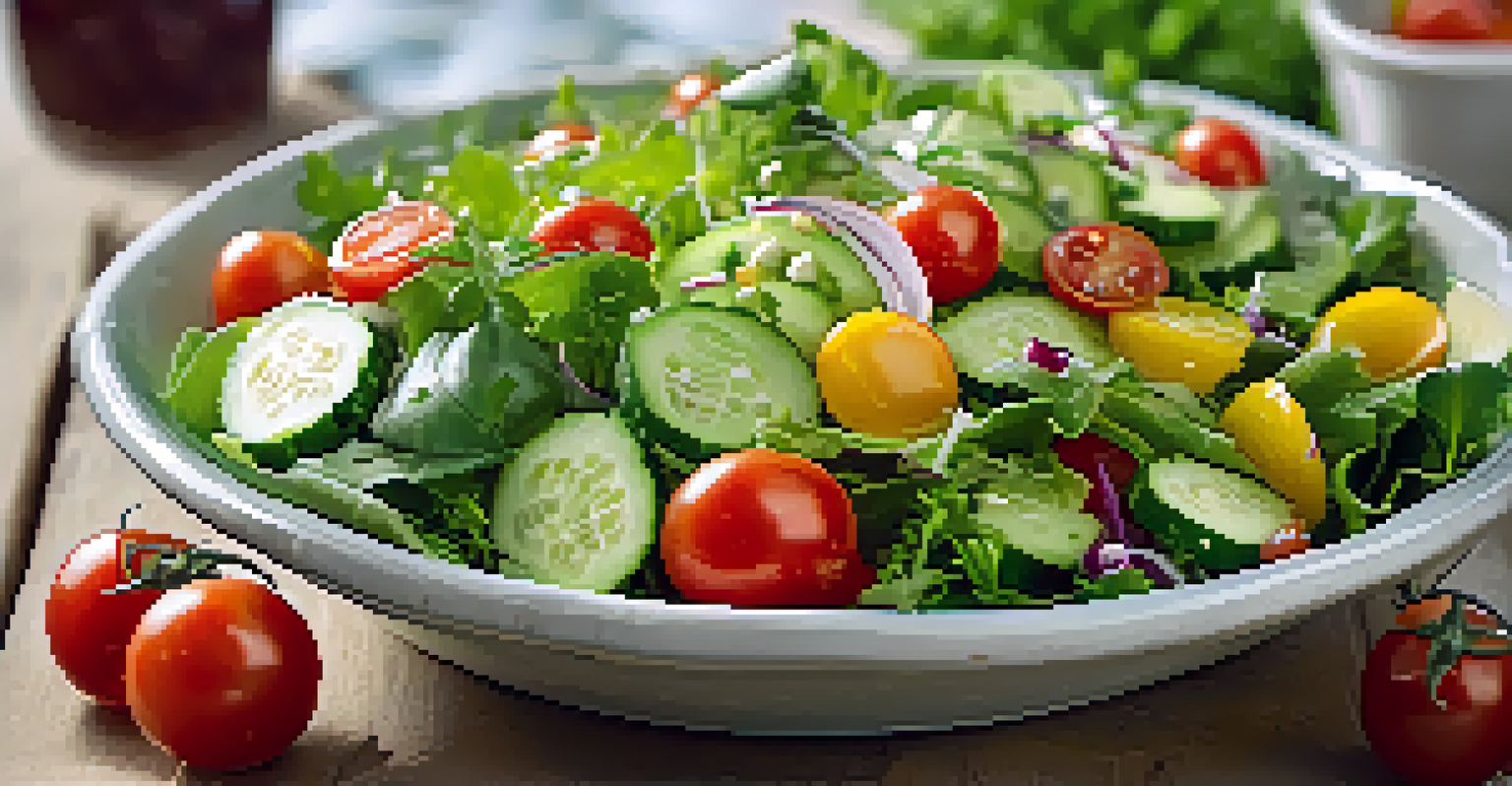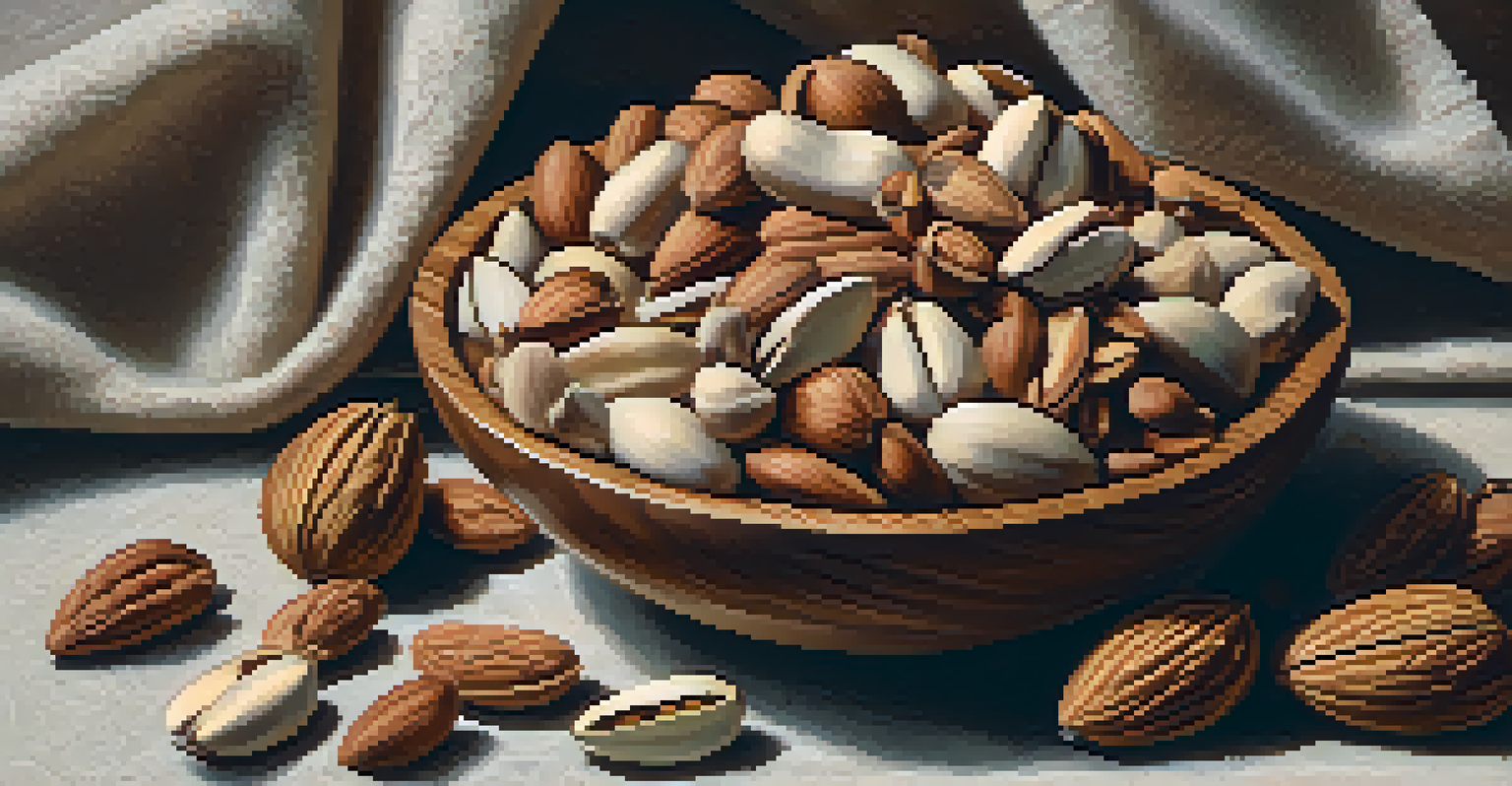Nutrients in Raw Foods: Key to Healthy Aging?

Understanding Raw Foods and Their Nutrient Density
Raw foods refer to uncooked, unprocessed foods that retain their natural nutrients. This category primarily includes fruits, vegetables, nuts, seeds, and sprouted grains. Unlike cooked foods, raw options often boast higher levels of vitamins, minerals, and enzymes essential for our body's functions.
Let food be thy medicine and medicine be thy food.
The concept of nutrient density is crucial here. Foods that are nutrient-dense provide a high amount of vitamins and minerals relative to their calorie content. For instance, a cup of spinach is low in calories but packed with vitamins A, C, and K, making it an excellent choice for those looking to enhance their diet as they age.
Incorporating more raw foods into your daily meals can lead to a more vibrant and energetic lifestyle. As we age, our bodies require more nutrients to maintain health, and raw foods can be a powerful ally in meeting those needs.
The Role of Antioxidants in Aging
Antioxidants are compounds that protect our cells from damage caused by free radicals, which can accelerate aging. Raw fruits and vegetables, such as blueberries, kale, and carrots, are rich in antioxidants, making them vital for a healthy diet. By neutralizing harmful free radicals, these nutrients help maintain our skin's elasticity and overall vitality.

For example, incorporating foods high in vitamin C, like citrus fruits, can help combat skin aging by promoting collagen production. This is essential for keeping our skin firm and youthful. Additionally, other antioxidants, such as vitamin E found in nuts, contribute to cellular health and can enhance our immune system.
Raw Foods Boost Nutrient Density
Incorporating raw foods into your diet enhances nutrient intake, providing essential vitamins, minerals, and enzymes that support overall health.
Thus, focusing on a diet high in raw, antioxidant-rich foods can be a strategic approach to slowing down the aging process. By making these choices, we not only nourish our bodies but also support our skin and overall health.
Essential Vitamins for Healthy Aging
Vitamins play a crucial role in our health, especially as we age. Raw foods are often abundant in essential vitamins such as A, C, D, and K. These vitamins support various body functions, from immune response to bone health, making them indispensable in our diet.
The food you eat can be either the safest and most powerful form of medicine or the slowest form of poison.
For instance, vitamin A, found in raw carrots and sweet potatoes, is vital for maintaining good vision and skin health. Meanwhile, vitamin C from raw bell peppers and strawberries is essential for collagen synthesis and immune function. By focusing on these vitamins, we can significantly improve our overall health and well-being as we age.
Incorporating a variety of colorful raw foods into our meals ensures that we receive a broad spectrum of these vital nutrients. This practice can lead to improved health outcomes and a more vibrant life in our later years.
Minerals That Support Longevity
Minerals are another critical component of a healthy diet, particularly for aging individuals. Key minerals like calcium, magnesium, and potassium are often found in abundance in raw foods. These minerals contribute to bone health, muscle function, and cardiovascular health, all of which are vital as we age.
For example, raw almonds are an excellent source of magnesium, which supports muscle and nerve function. Leafy greens, such as kale and collard greens, are rich in calcium, essential for maintaining bone density. By including these mineral-rich foods in our diet, we can support our body's functions effectively.
Antioxidants Combat Aging Effects
Raw fruits and vegetables are rich in antioxidants, which help protect cells from damage and maintain skin elasticity as we age.
Ensuring adequate mineral intake through raw foods not only promotes longevity but also enhances our quality of life. A well-rounded diet that includes a variety of minerals is key to maintaining health as we age.
The Benefits of Enzymes in Raw Foods
Enzymes are biological catalysts that facilitate various biochemical reactions in our bodies. Raw foods, especially fruits and vegetables, are rich in enzymes that aid in digestion and nutrient absorption. As we age, our body's enzyme production tends to decrease, making it even more crucial to consume enzyme-rich foods.
For instance, raw pineapple contains bromelain, an enzyme that helps break down protein and can improve digestion. Similarly, raw papaya is packed with papain, which offers similar benefits. By incorporating these fruits into our diet, we can enhance our digestive health and overall nutrient uptake.
Thus, consuming raw foods not only provides essential nutrients but also supports our digestive system as we age. This can lead to better nutrient absorption and improved overall wellness.
Hydration and Raw Foods: A Vital Connection
Staying hydrated is crucial for maintaining health, especially as we age. Many raw foods, particularly fruits and vegetables, have high water content, which can contribute significantly to our daily hydration needs. For example, cucumbers and watermelon are not only refreshing but also packed with water, helping keep our bodies hydrated.
Proper hydration supports various bodily functions, including digestion, circulation, and temperature regulation. It also aids in maintaining healthy skin, which can show signs of aging if not adequately hydrated. By incorporating high-water-content raw foods into our diet, we can support our hydration needs more effectively.
Hydration from Raw Foods Matters
Many raw foods have high water content, promoting hydration that is crucial for bodily functions and maintaining healthy skin.
In this way, raw foods can serve as a delicious and nutritious way to boost our hydration, making them an excellent addition to a healthy aging strategy.
Practical Tips for Incorporating Raw Foods
Incorporating more raw foods into your diet doesn't have to be daunting. Start by adding a colorful salad of raw vegetables to your meals or snacking on fresh fruit instead of processed snacks. You might even try blending some leafy greens into your smoothies for an easy nutrient boost.
Consider exploring new raw recipes that excite your palate. Dishes like zucchini noodles or raw energy bars made from nuts and dates can make healthy eating enjoyable and satisfying. Finding creative ways to enjoy raw foods can encourage you to make them a regular part of your diet.

Remember, the journey to healthy aging through nutrition is a gradual process. By making small, consistent changes towards incorporating more raw foods, you can significantly impact your health and well-being over time.